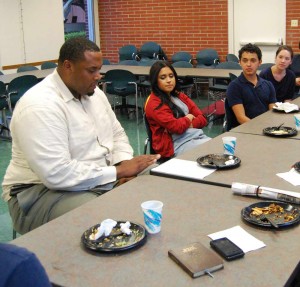USC provides diverse religious opportunities
When Tamar Partamian, a junior majoring in architecture, gave a friend a tour of USC’s campus, the friend turned to her and asked, “Is this a seminary?”

Community · (From left) Timothy Conley, the club’s adviser, and Laleh Mehria, Kasra Behizad and Ailene Huang, of the Baha’i Student Association, discuss the club’s plans. - Olivia Garcia | Daily Trojan
It’s hard to overlook the presence of religion on campus. Walking down University Avenue, students pass the USC Hillel building and the new $35 million USC Caruso Catholic Center, currently under construction. Crossing onto Trousdale Parkway, students pass the United University Church and a quick turn onto 34th Street brings students by the University Religious Center.
What’s easy to miss, though, is just how much is going on inside these buildings. With more than 90 student religious groups, USC has the widest array of religious organizations of any American university, according to Dean of Religious Life Varun Soni.
That diversity, in part, springs from the growing number of international students attending USC; with cultural diversity comes religious diversity. But the Rev. Jim Burklo, associate dean for religious life, says the growth in religious groups on campus also represents a cultural change.
“Particularly at universities, people became more comfortable being public in their personal identities — in every way,” Burklo said. “People started being more willing to be public about it and there was more of an acceptance of differences and cultural differences.”
At the weekly meetings of the Interfaith Council, accepting cultural differences is the goal, the theme and the norm. The council, a group of about 25 to 30 students that spans religious traditions including Sikhism, Hinduism, Catholicism, Atheism and the newly coined “transpiritualism,” is focused on bringing people of different faiths together to discuss their beliefs and to learn from each other.
About one-third of the members of the Interfaith Council identifies itself as spiritual but not religious, a trend that has become more common with this generation of college students. The Office of Religious Life has tried to orient itself around this tendency toward spirituality.
“Our office is not really oriented around God, we’re oriented around meaning,” Soni said.
That means a focus on community service, rather than dogma and doctrine, and an emphasis on interfaith dialogue.
“9/11 showed us that interfaith is not a luxury but a necessity,” Soni said.
USC launched an interfaith service initiative Sunday, in conjunction with the anniversary of 9/11.
“You’re the first generation that actually will strengthen their own faith or their own beliefs by being exposed to the faith or beliefs of others,” Soni said. “It’s not threatening, it’s actually enriching and edifying.”
Jem Jebbia, a senior majoring in Japanese, business administration and religion and the president of the Interfaith Council, believes religion can be a tool for good if people of different religions understand each other. The key, she said, is for students to be willing to listen and to share.
“The biggest source of discomfort is the idea of someone trying to push their beliefs on you,” she said. “But we’re not trying to change your ideas.”
Instead, the council emphasizes discourse. Each week, it tackles a different question respectfully, talking in turn, nodding in agreement and encouraging others to share.
At last Tuesday’s Interfaith Council meeting, the question was simple: What is it like to practice your religion or spirituality as a student?
Students addressed the convenience of having friends of the same religion nearby and the availability of discussion groups like the Interfaith Council. They also mentioned the challenges of finding time to pray daily, or learning to coexist with people of very different religions — challenges that confront students of all faiths.
Layne Kaplan, a junior majoring in broadcast and digital journalism and the president of USC Hillel, said one of the biggest challenges for her group is keeping students engaged with their Jewish background. Right now, she says, Hillel only reaches about 30 percent of the Jewish students on campus.
“I think finding balance is the biggest problem,” Kaplan said. “For example, I’m in this theater class that meets every Friday for a show but every Friday is Shabbat dinner, so it’s making those sacrifices. If I miss a Shabbat dinner does that mean I don’t care about my faith? No.”
Kaplan, like other students, said a sense of community has helped her maintain her connection to her faith. For her, Hillel provides that community. For Partamian, it’s the Baha’i Student Association, even though she herself is Christian. And for Ifrah Sheikh, a sophomore majoring in fine arts, it’s the Interfaith Council.
“These people are my family,” Sheikh said.
